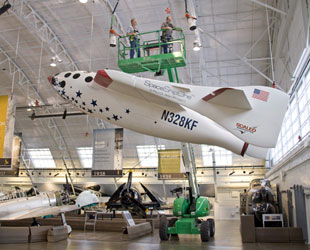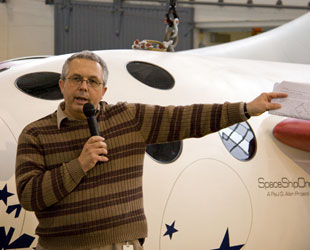January 14, 2009 — Billionaire Paul Allen has acquired SpaceShipOne, again.
The co-founder of Microsoft, who in 2004 sponsored the development of the world's first privately-funded crewed spacecraft, added Tuesday a replica of SpaceShipOne to his publicly-displayed collection of aviation artifacts. The 28-foot, full scale model was hung in the Flying Heritage Collection's Paine Field hangar in Everett, Washington, to continue the museum's narrative theme of presenting the evolution of flight.
"One of the key ideas behind the collection is the changing of technology and how it affects aviation," said Adrian Hunt, executive director of the Flying Heritage Collection. "SpaceShipOne actually fits in very well within that broad message."
"For example, at one end of the spectrum, we have the Messerschmitt 163, the first operational rocket plane from the middle 1940s near the end of the second World War, and then maybe its natural descendant, which would be SpaceShipOne," Hunt explained during an interview with collectSPACE.

A replica of SpaceShipOne is hung above its predecessor, the Messerschmitt 163 rocket plane. (Flying Heritage) |
The Flying Heritage Collection's SpaceShipOne is in fact, a descendant of the original, which since 2005 has been on display in Washington, DC at the Smithsonian National Air and Space Museum. The molds used to build the real spacecraft were used again to cast six replicas by Scaled Composites, the Mojave, California company headed by SpaceShipOne's designer, Burt Rutan.
The first of those replicas went on display in July 2006 at the Experimental Aircraft Association's (EAA) AirVenture Museum in Wisconsin. Carefully painted to exactly match the exterior appearance of SpaceShipOne after flying the two sub-orbital flights that won it the $10 million Ansari X Prize in October 2004, the EAA's replica was modified to allow the vehicle's tail fins to feather.
Since then, additional replicas have been installed in the William M. Thomas Terminal at Meadows Field Airport in Bakersfield, California; at the New Mexico Museum of Space History in Alamogordo; outside in Legacy Park at the Mojave Air and Space Port in California, near where pilots Mike Melvill and Brian Binnie flew the original three times to space; and even at Google's Headquarters in Mountain View, California (co-founder Larry Page was an X Prize trustee).
There have also been temporary exhibits, such as during the 2007 World Space Expo at NASA's Kennedy Space Center Visitor Complex, where SpaceShipOne joined the historic launch vehicles on display in their rocket garden.
As with all of the others, the Flying Heritage Collection's SpaceShipOne is an exterior replica only. The interior is empty, though the EAA suspended M&M candies inside of theirs, mimicking the impromtu zero-gravity demo that pilot Melvill made during his first flight on June 21, 2004.

FHC executive director Adrian Hunt addresses museum guests before raising the replica SpaceShipOne. (Flying Heritage) |
That Allen, who solely funded the construction of the first and only SpaceShipOne was also seemingly the last to receive a replica may seem odd, but it was more a factor of when delivery could be accepted.
"This museum only opened on June 6th of last year. Mr. Allen had been collecting these aircraft for several years but he had been waiting to have a sort of critical mass of flying aircraft to actually open the museum," said Hunt.
And although SpaceShipOne is their only replica and the only spacecraft in the museum, Hunt feels its inclusion is appropriate for more reasons than simply Allen's history.
"I think it gives [SpaceShipOne] a wonderful historical context. Our collection goes from a wood and fabric Curtiss Jenny from 1918 through the Messerschmitt 163 Comet, an all-metal rocket-powered plane. So this is the birthplace for this wonderful technology... and out of this came rocketry and jets," said Hunt. "I think it gives it a very different context from what you might see where it is displayed elsewhere."
